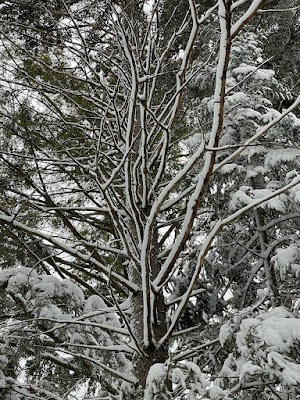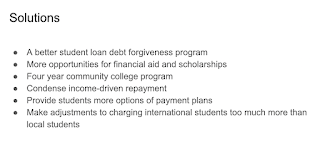Sunday, March 05, 2023
Saturday, March 04, 2023
Icing
Thursday, March 02, 2023
Inhuman age?
Wednesday, March 01, 2023
Listing
Christianity
Buddhism
Islam
Hinduism
Judaism
and then continued with Sikhism, Zoroastrianism, Confucianism, Daoism, Jainism. Those first five recur everywhere you look for accounts of religion in public life, including materials we've
 and showed the response I got when I asked ChatGPT the same question. Many in the class recognized the template right away. Eight religions? This was too many! (Though the inclusion of Baha'i at #7 was interesting.) But ChatGPT is eager to please and if you don't like what you get you can ask it again and get a different response/
and showed the response I got when I asked ChatGPT the same question. Many in the class recognized the template right away. Eight religions? This was too many! (Though the inclusion of Baha'i at #7 was interesting.) But ChatGPT is eager to please and if you don't like what you get you can ask it again and get a different response/ The second time through I got six: the big five and Sikhism - as #5 in fact. ChatGPT seemed to think world religion status was just about number of adherents. That's not quite right. I asked one more time.
The second time through I got six: the big five and Sikhism - as #5 in fact. ChatGPT seemed to think world religion status was just about number of adherents. That's not quite right. I asked one more time. This time I got ten! Ten? (How on earth could Shinto be a world religion?) I didn't linger over the particulars; students got the absurdity of the project. Common sense was teerering...
This time I got ten! Ten? (How on earth could Shinto be a world religion?) I didn't linger over the particulars; students got the absurdity of the project. Common sense was teerering... After a fourth query, I gave up, I told them. Eight again? (But now Taoism has taken Baha'i's place.) Read carefully these four ChatGPT responses were in fact all giving the same information packaged differently, and all of them were missing the "big five" construct.
After a fourth query, I gave up, I told them. Eight again? (But now Taoism has taken Baha'i's place.) Read carefully these four ChatGPT responses were in fact all giving the same information packaged differently, and all of them were missing the "big five" construct. Tuesday, February 28, 2023
Monday, February 27, 2023
Faithful accessory
Sunday, February 26, 2023
Higher education in society
Saturday, February 25, 2023
Curation
Friday, February 24, 2023
Out of body experience
Thursday, February 23, 2023
Wednesday, February 22, 2023
After history
which can be read many ways. First: wow, whatever is being measured is falling quickly! Next: wow, it was really high not long ago, though... and what was it? Golly: large if falling numbers of Americans still think that "God has granted America a special role in human history"! My failed google.doc prompt was an attempt to get at the same issue in a not explicitly religion-related way.
But - depending on precisely such things as whether you think the United States is "God's own country" - you can also read the graph as a call to arms. Those declining lines need to be pushed upward again, and can be if American schools (and universities) teach patriotism rather than nihilism, "traditional values" rather than relativism... (At this point I may have said some intemperate things about Florida Governor Ron DeSantis' multi-pronged attacks on public education.)
But maybe I'm not being fair to the students, or myself. Their responses to the question equivocated in ways of which I approve. There is no way to account for all of the parts of our history, wrote one, and therefore, there is no way to clearly, objectively choose what is the most important/main direction and purpose. Another wrote that they feel like all history is important. it’s about understanding and learning the history that creates its direction/purpose. There are times and places that are important to people because of their personal connections/fascinations.
Many noted wrily that people crave the idea of one big purpose - may even be lost without one. Wrote one student, It is comforting to imagine ourselves as the focal point of the universe, and just for a second hope that maybe we do have some sort of agency. Otherwise I find it very overwhelming that we may be here for no reason at all. But many others found comfort in more modest meanings. The direction and purpose for human history doesn't necessarily have to be collective objective rather than personal, another opined; I think that by addressing it as a collective task it leads to forms of oppression and manipulation.
There were a few answers to the question as posed - our purpose here is very basic, make relationships, be kind, help others as often as you can or to try and make life better for the next generation or to continually create a “Beloved Community” or, on the other hand perhaps the main purpose of human beings as a species is evolution in all aspects, indeed I have a friend that thinks humans were put here by the universe to try and figure itself out. Others saw the question itself as problematic, as History is written and remembered by the winner. Some observed that We only focus on modern history, since so much was erased as it was discovered by the West; in fact, argued another, I think the direction thing is a tool used to justify colonialism in the name of “the chosen people.” Another worried: can purpose and direction be separated from capitalist work-ethic thinking? How can we ground ourselves in a different type of purpose?Tuesday, February 21, 2023
Monday, February 20, 2023
Saturday, February 18, 2023
Friday, February 17, 2023
Different universities are possible
Thursday, February 16, 2023
Wednesday, February 15, 2023
Undead
Trotted out the dead white men in "After Religion" today, as part of a rather overambitious overview of secularization as a god that failed, secularism as an imperfect and embattled political ideal, and secularity as the frame of contemporary spiritual subjectivity.
 It was introduced by Nietzsche's famous claim that "God is dead" and underscored by an attempted coup de théâtre. There's a whiteboard on wheels in the lecture hall, and at one point I casually spun it around to reveal a famous piece of bathroom grafitti:
It was introduced by Nietzsche's famous claim that "God is dead" and underscored by an attempted coup de théâtre. There's a whiteboard on wheels in the lecture hall, and at one point I casually spun it around to reveal a famous piece of bathroom grafitti:
GOD IS DEAD - Nietzsche
NIETZSCHE IS DEAD - God
This wasn't the last word, of course. Indeed, we had a google.doc asking the question Time magazine put on its cover in 1966, in the heyday of "death of God theology," which provoked some interesting reflection on what was and is and can be alive in the first place.
What God (sic) makes of all this is anyone's guess!
Monday, February 13, 2023
Sunday, February 12, 2023
Generative
My hunch that this generation's sense of the flow of history away from organized religion is widely shared was confirmed (or was the AI picking up only on news reports about the rise of the "nones"?). ChatGPT isn't in the business of making up new things after all, just repackaging old ones. But I did get some fun narratives when I asked specifically for three generations starting in the present.















































